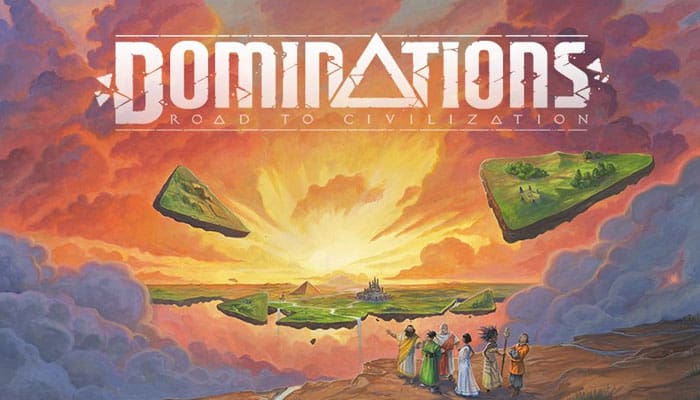
Welcome to Dominations! Take on the role of a primitive tribe and transform it into a Nation whose influence will echo through the ages...
Place your triangular Land tiles carefully to expand your population and attain the Knowledge that will determine how your society is shaped over time.
Components

- 90 Land Tiles
- 288 Mastery Cards
- 4 Player Boards
- 60 City counters
- 4 Victory counters
- 4 Influence counters
- 4 Initiative counters
- 12 Monument standees
- 48 sliders
- Cradle of Humanity
- 50 Monument Level Cards
- 12 Monument Cards
- 6 Domination Cards
- 4 Campfire Cards
- Score Board
- 16 Objective Cards
- 32 Gaming Aids
- 16 Score Tokens
- Instructions
Object of the Game
You can use this Knowledge to build Cities and master Skills; thus creating the legacy for which your civilization will be remembered. Each time you master kill it becomes one of the pillars of your society, opening doors to new possibilities and increasing your power.
Doing all this and more will earn you points, and the player with the most points at the end of the game wins!
Setup

1 Place the Cradle of Humanity tile in the middle of the table.
2 Place the Mastery cards on the table, organized into their respective holders that they are accessible to all.
3 Place the Scoreboard to one side of the table.
4 Place the Domination cards next to the Scoreboard.
5 Each player draws 2 Objective cards and 2 Monument cards. They then choose 1 of each and reveal them to each other simultaneously. The Objectives and Monuments that were not chosen are then placed back into the game box.
Place the Monument cards next to the Scoreboard, visible to all. Place the level cards for each Monument in a pile (in order, starting with the Level 1 card on top) on their Monument card. Place the Monument's standee next to its card.
6 Each player takes one Player board along with the necessary Knowledge sliders (1 of each Domain color and 6 Reserve Limit sliders), as well as the player tokens in the color of their choice. Place the Knowledge sliders at the bottom of the board, under 0. Place the Reserve Limit sliders on the first level of each Domain (above the 5).
7 Place the Land tiles into their holders. Each player then draws a hand of 7 Land tiles. If they wish, a player may discard part or all of their hand and redraw so as to have 7 Land tiles in hand. They may only do this once.
8 Each player takes a Campfire card.
9 Randomly determine the order of play for the first Age. Place the Initiative tokens by order of turn on the Initiative track which is located on the Cradle of Civilization tile (with I being the first player). Then, place the Influence and Victory Point tokens for each player next to the scoreboard.
You're ready to go!
Game Play
Players take turns starting with the first player on the Initiative track and ending with the last.
Initiative: in case of a tie in any situation, the winner is always the highest placed (closest to first) player on the Initiative track.
Each turn is part of an Age. Each Age is composed of 5 Turns for each player. Once players have played 5 Turns each, there is an End of Age Phase.
A Game of Dominations lasts 3 Ages. At the end of the Third Age, the player with the most Victory points wins.
You score points during each Age by:
-
Acquiring Mastery Cards

Each Civilization is characterized by its achievements - technological, cultural or otherwise.
Mastery cards offer you a variety of ways to acquire Victory points, whether by simply possessing them or by activating their unique effects.
-

Possessing Influence
There is no direct conflict or warfare in Dominations, but there are multiple ways to exercise your influence on the world around you.
Players score Victory points based on their Influence score and can also assimilate Mastery Cards from other players if they possess the most at the end of an Age.
-
Dominating Domains
At the end of each Age, you lose any remaining Knowledge you have in stock.
Before doing so however, the player with the most remaining Knowledge in each Domain will be awarded a Domination card - a unique character that gives them points and a special power for the next Age.
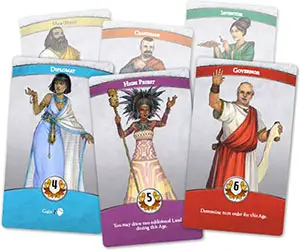
You score additional points at the end of the final Age by:
Achieving Objectives
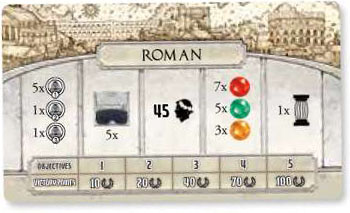
The game's Objective cards give you the opportunity to walk in the steps of one of the great civilizations of the past.
They offer you a sense of direction at the beginning of the game, constraining you to achieve certain results, but also rewarding you with points if you meet their rather hefty requirements.
Game Turn
Each player turn is divided into 3 Phases:
- the Grow Phase
- the Build Phase
- the Develop Phase
Once players have played 5 Turns each, proceed to the End of Age Phase.
I. Grow Phase
The Grow phase represents the growth of your population and its spread into new and undiscovered territories! During this phase of the game, players place their triangular Land tiles around the Cradle of Humanity.
Over time, your Nations will come into contact and learn from one another. With each Land tile you place, your Nation grows larger, and as your Civilization grows, it will also learn - placing Land tiles earns you Knowledge, which is the main resource of the game.
There are 6 Domains of Knowledge in Dominations:
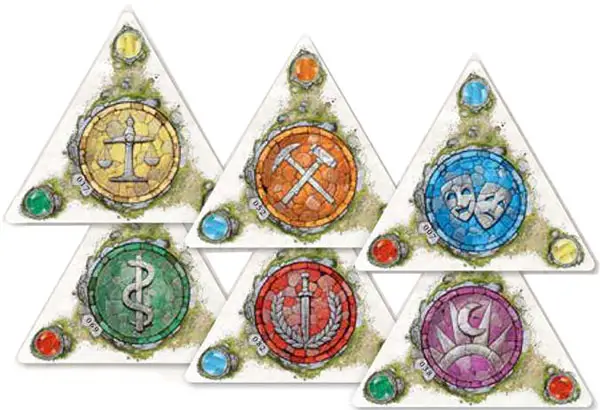
-
Trade: Yellow
Represents the principles of trade, wealth, and negotiation.
-
Craftsmanship: Orange
Represents the disciplines of construction, farming, mining, woodwork, and metallurgy
-
Art: Blue
Represents painting, sculpture, theatre, poetry, but also oratory arts such as public speaking and diplomacy.
-
Science: Green
Represents the principles of mathematics, medicine, astronomy, and alchemy.
-
Government: Red
Represents the civic ideas of living as a society, such as administration, schooling, and military.
-
Religion: Purple
Represents the concept of theology and worship.
During their turn, the player must start by placing a Land tile from those available in their hand. This Land tile must be placed so that at least one side connects entirely to either the Cradle of Humanity or any available Land tile (which can be a tile placed by another player).
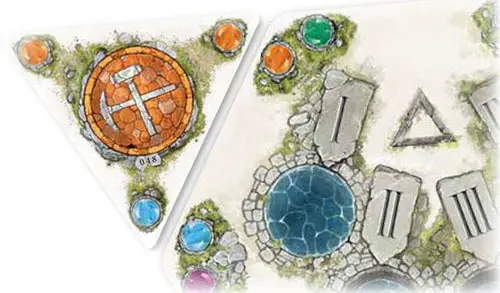
The player accumulates Knowledge based on the colors that are connected during this placement. The four resources present on the two tiles along the connected edge are activated and each produce 1 Knowledge point of the corresponding domain for the player who placed the Land tile.
In addition, the Camp of the placed Land tile also produces 1 Knowledge point of the corresponding Domain.
- The "Camp" is the larger colored space in the center of the Land tile.
- The "Resources" are the three smaller points around the outside of the Land tile.
Each time you gain Knowledge points, move your counter of the corresponding Domain on your Player Board to represent the Knowledge you gained.
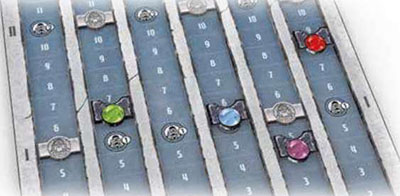
Concentration of Knowledge
When two resources of the same color are connected face to face, they produce an additional Knowledge point of their color.
Example: In the case below, Knowledge is attributed in the following way.
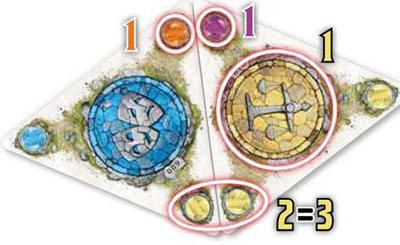
This tile placement produces 1 Craftmanship, 1 Religion, and 4 Trade (1 for the Camp and 3 for the matching resources which create a Concentration of Knowledge bonus as described above).
Produce Vs Gain
In Dominations, Producing Knowledge and Gaining Knowledge are two different effects that must be taken into account separately.
Placing a Land tile allows you to Produce Knowledge. Your Production can be improved by the Concentration of Knowledge effect, as well as the presence of Cities (cf. Building a City) or Monuments (cf. Building a Monument).
However, certain Mastery cards (cf. Develop a Mastery) as well as other cards can also affect the result, allowing you to Gain additional Knowledge based on your initial Production. Be sure to consider the difference between the two terms when resolving their effects! See the FAQ for more details.
Example: In the case above, a player with the "Bartering" Mastery card would Gain 1 extra Trade point.
The Locus
During the game, a player may complete a wheel of 6 Land tiles, thus creating a Locus. In this case you do not Produce the resources present on the connected edges but rather all the resources in the center of the Locus, as well as the point from the Camp on the Land tile you added. However, when a Locus is created, the "Concentration of Knowledge" rule does not apply.
On top of these resources, you'll also be able to activate certain Mastery cards, as well as all Cities on Land tiles that are part of the Locus.
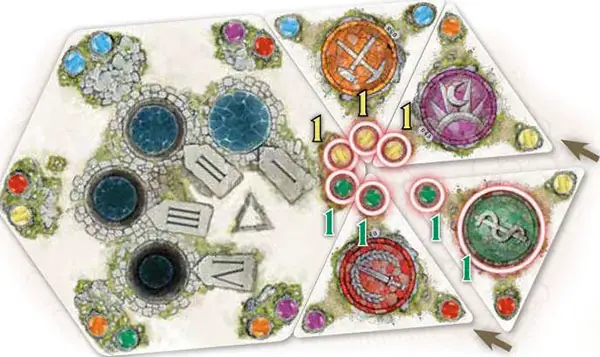
Please note: If a tile placement creates several Locus simultaneously, then the player does not score them all - they must decide which Locus they wish to score.
Vestioium Knowledge
During the game you may gain Vestigium Knowledge, whether it be through Production  or Gained through effects
or Gained through effects  .
.
When you acquire this Knowledge it may be of the Domain of your choice. It can also be split between multiple Domains unless instructed otherwise.
Reserve Limits
At the beginning of the game, players are limited to 5 Knowledge points in each Domain. If the player acquires Knowledge that would take them beyond that limit, the additional Knowledge is lost. You can increase your limit by building Cities and purchasing certain Mastery cards. When your limit is increased, move your Reserve Limit slider up to your new limit to represent this.
When your Reserve of points reaches 20 you cannot increase it further. If the player acquires Knowledge that should take them beyond that limit, the additional Knowledge is lost. However, the player gains 1 Victory point (regardless of how much Knowledge is lost) every time they would go over 20.
II. Build Phase
During this second phase of their turn the player can, if they wish, build a City OR contribute to a Monument.
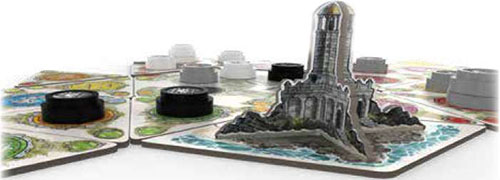
Building a City
Cities are the hubs of your Civilization and proof of its growing influence and wealth. They provide big advantages during the game by affecting Mastery cards, your Influence score and how much Knowledge you can stock at any given time.
A City must be built on a Land tile's central Camp space. In order to build a City, the Camp must be unoccupied and the player must pay Knowledge points of the same Domain color as the Camp on which it is placed.
Once these points have been paid, the player then places a City token on the relevant Camp space.
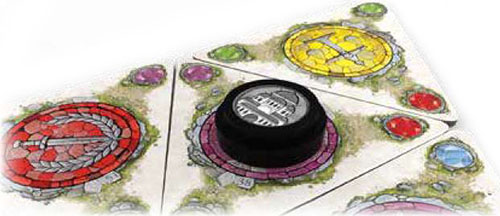
A City can be built on any Land tile with an unoccupied Camp space, no matter which player the Tile was placed by and when.
A player can also upgrade an existing City, taking it up to level 2 or 3, by paying Knowledge points based on the color of the Camp. When a City is upgraded, a new City token is placed on top of the existing one to show that it has gained a level.
Cities must be upgraded one level at a time: you cannot immediately build a City of level 2 or 3. The maximum level a City can reach is 3. Each player has a limited number of City tokens, and once they have been spent, you cannot build any more Cities.
Once purchased the City also gains you bonuses depending on its level:
City Level 1:
- Cost: 3 Knowledge of the appropriate color.
- Influence : +1
- Increases Reserve of that color to 10
City Level 2:
- Cost: 6 Knowledge of the appropriate color.
- Influence: +2
- Increases Reserve of that color to 15
City Level 3 :
- Cost: 9 Knowledge of the appropriate color.
- Influence: +3
- Increases Reserve of that color to 20
Trading
As well as earning you Influence points and expanding your Reserve - thus allowing you to stock more resources - Cities are a great way to easily obtain additional Knowledge points.
Any time a player connects a Land tile to another Land tile upon which a City has been built, the owner of the City gains a Knowledge point of that City's Domain per level of the City.
Additionally, if a player forms a Locus (by completing a full circle of 6 Land tiles), any Cities situated on the Land tiles forming the Locus are immediately activated with their owners gaining Knowledge points as stated above. So choose where you place your Cities carefully!
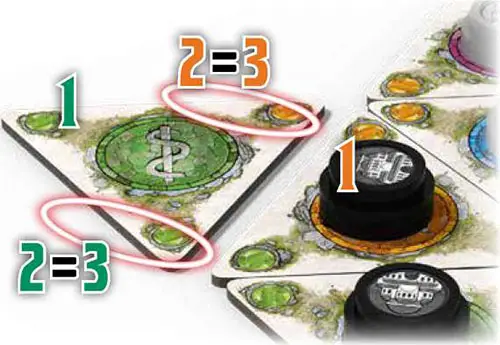
Building a Monument
Throughout history, humanity has erected some truly awe-inspiring structures. Testaments to science, culture, faith and more. In Dominations, your civilization can also leave its mark on the world...
Monuments are a common objective that all players can take part in if they wish. Each time a player contributes to a Monument, they gain specific Victory points and bonuses.
If a player wishes to buy the first Level of a Monument, they must first place the Monument's Tile on the Board according to the restrictions shown on its card (if any). Monument tiles come in two shapes: Diamonds and Circles.
Diamonds must be placed next to an existing Land tile following the normal restrictions for Land tile placement. They must also be placed adjacent to a City of a certain Domain. Consult the Monument's card for more details.
Some of these Monuments mark the shores of great seas or the borders of your lands. As such, they may only be connected to Land tiles via sides that possess a Reward Icon and Land tiles may only later be placed connecting to sides that possess a Reward Icon.
Cities built next to these immediately gain their owner that reward. These may be gained when the Monument is placed or later, when the City is built. These rewards are only scored once, not per City level.
Note: The "Great Wall" Monument tile counts as a diamond.
Example: In the case below, the Pharos Monument awards points to adjacent Cities. The Trade City which was present when the Monument was placed belongs to the Black player: they immediately gain 10 Victory points.
Later on in the game, if another player builds a Science City on the available space next to the Monument, they will also gain 10 Victory points.
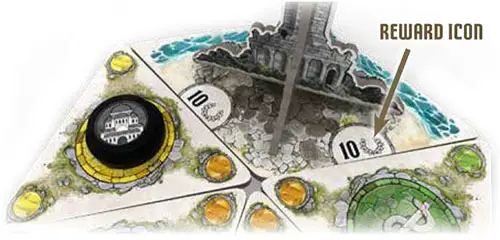
Circular Monuments are placed over the center of a Locus. Each one of these Monuments is affiliated with Cities of a certain Domain. For each City of the corresponding Domain present in the Locus, that City's owner gains points as indicated on the Monument's card.
These can be scored immediately when the Monument is placed, or later when a City is built next to the Monument.
Example: In the case below, the Hanging Gardens Monument awards points to Craftsmanship Cities. The White player will therefore gain 5 Victory points when the Monument is placed, as they have 1 Craftmanship City on the Locus (the City's level is not taken into account).
The Black player also gains 5 points as they too have a Craftmanship City on the Locus. If another player builds a City on the available Craftmanship Camp later in the game, they will immediately gain 5 Victory points as well.
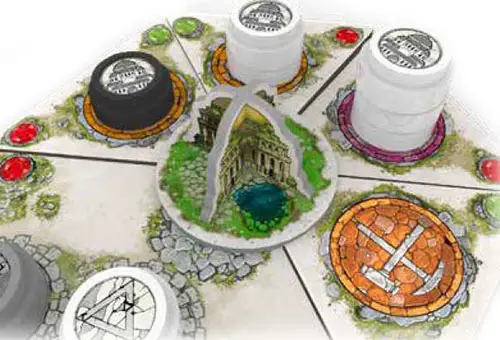
Note that even though certain Monuments have Knowledge indicated on their Tiles, you do not Produce or Gain any Knowledge by placing down a Monument.
However, any Land tiles subsequently connected to the tile activate those resources as per the normal rules. Circular Monuments can be placed over resources belonging to a Monument Tile.
Any player can then participate in the construction of a Monument by paying the resources shown on the top Monument Level card. Once purchased, the player takes the Level card in question and integrates it into their Civilization Tree, just like a Mastery card (see Develop Phase section below).
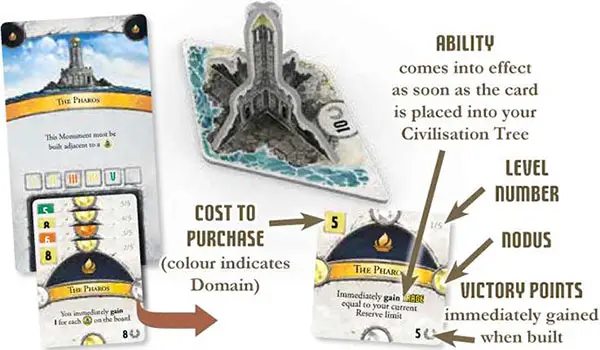
Common objective: Monument levels must be built in order (you cannot build level 2 before someone has built level 1). However, any player may build the current level available (the one on the top of the pile) even if they did not build the previous one(s).
Monument Level Cards: Players may look at any of the momument level cards (and not just the one on top) as they please.
Dominating Monuments: Players compare the number of level cards in their Civilization tree and the number of City levels they control that are adjacent to a Monument in order to determine who controls it (see Objectives and Final Scoring).
Monument effects: Some Level cards have effects written on them. These bonuses take effect as soon as the card is integrated into the Civilization Tree.
III. Develop Phase
In this final phase of your turn, you can choose to develop the skills which will become the pillars of your Civilization. All Domains start out with similar abilities but as you work your way through them you will find that each has their own speciality.
Combining these cards into powerful combos will give you a big advantage as the game moves forward.
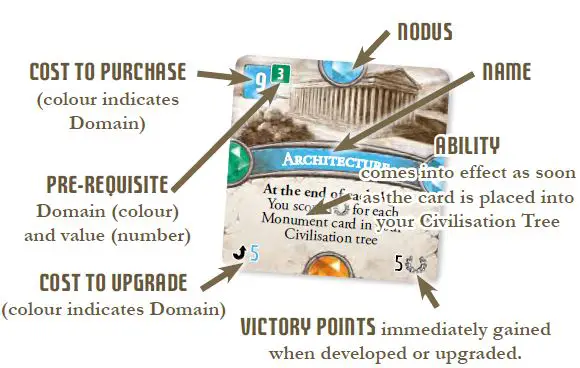
During your turn, you may only develop 1 new Mastery card OR upgrade 1 previously acquired Mastery card.
Develop a Mastery
During their turn, a player can acquire a new Mastery card by paying the value required to develop that card, then adding it to their Civilization Tree.
These Mastery cards represent various skills such as Painting, Road Building, Agriculture, and so on. The effects noted on the card take effect as soon as it is placed into your Civilization Tree.
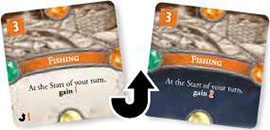
There are 3 different values of Mastery card available: value 3, value 6, and value 9. Mastery cards at a value of 9 are quite an investment and also have prerequisites, but their effects are the most powerful!
A player can also upgrade the Mastery cards they already possess. To do so, pay the required cost for each card (indicated in the lower left hand corner) before turning it over. It is then considered Advanced (with a black background).
Prerequisites
Level 9 cards have a second, smaller value and Domain alongside their Cost; this is their prerequisite. To acquire such a card, you must already have another Mastery card of that Domain and Cost (or higher) in your Civilization Tree.
Rule of 1
You may only have 1 copy of any Mastery card in your Civilization Tree.
Whether you're acquiring a new Mastery or upgrading an existing one, the effects noted on the card, including the scoring of Victory and Influence points, take effect as soon as it is acquired/improved.
Civilization Tree
Your Civilization Tree represents the disciplines upon which your Nation has been built. Each Mastery card that you obtain becomes one of the fundamental elements of your Civilization, an integral part of your Legacy for which you will be remembered through the ages.
During the game, you will be building your Civilization Tree around your Campfire card.
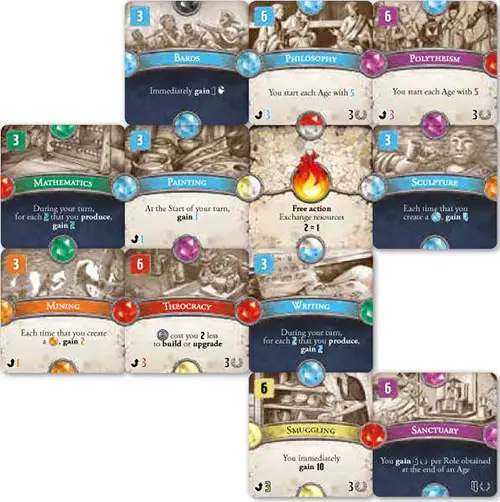
Campfire card: Your Campfire card is the starting point for your Civilization Tree. As well as allowing you to acquire new Mastery cards, this card grants you a free exchange action.
At any time during your turn, you may use it to transform 2 Knowledge of the same color into 1 Knowledge of a different color. You may perform this action as many times as you like.
To integrate a card into your Civilization Tree, you must first be able to place it. A card must be placed:
Directly adjacent to a card you already own (not diagonally).
Some cards will include the NODUS icon. Note that this icon refers to a full Nodus produced by connecting 2 cards. Half Nodus' that have not been connected yet do not count.
So that it is connected to any adjacent cards via a Nodus of identical color (Nodus are the colored half-circles on the sides of the cards, which connect with other cards to create a full Nodus).
If you cannot fulfill these three conditions when acquiring a new card, you may not take that card. Each Mastery card is available in four copies, which each copy having a different Nodus configuration. Once a card has been placed, it cannot be moved.
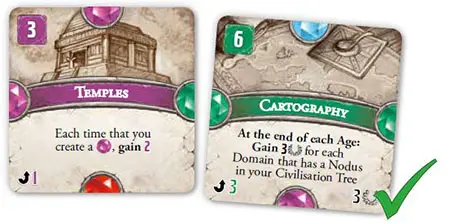
Vestimum
White nodes on Mastery cards are called Vestigium. These can connect to any other color and count as a Nodus of that color. They also often appear on Monument Level cards. However, two Vestigium cannot be joined together.
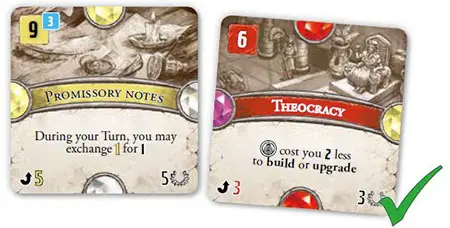
Corruptio
Black nodes on Mastery cards are called Corruptio. These cannot connect to any other Nodus, even other Black ones. They are effectively a dead end in your Civilization Tree.
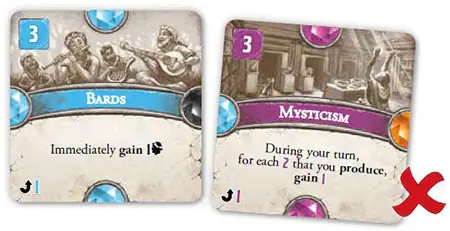
Once the Development phase is over, the turn passes to the next player on the Initiative track.
The Score Track
There are two different types of scoring in Dominations: Influence Points and Victory Points.
Influence Points

There are no wars in Dominations, but over time, your Nation will become more powerful and influential, and Influence Points represent this growing prestige.
As soon as you acquire an element with the "Influence" symbol, you advance your Influence counter on the Influence track to represent this. The Influence track is the yellow track that goes around the edge of the scoreboard.
Influence is mostly taken into account at the end of each Age but can have other effects as well.
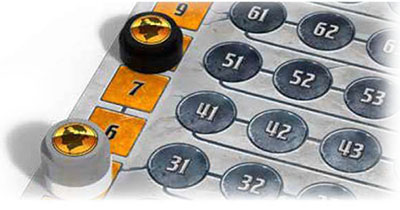
Victory Points

In Dominations you will regularly score Victory Points and it is these points that will win you the game! Your contributions to Monuments, your Mastery cards and many other effects will provide points and allow you to move along the score track.
As soon as you acquire an element with the Victory point symbol you immediately score that many points - advance your token on the Victory track to represent this. The Victory track is the grey track that snakes around the center of the board.
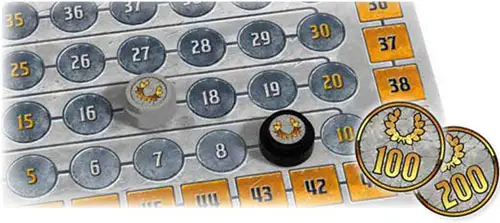
If you reach the end of the Score Track (100 for Victory points and 50 for Influence) take the corresponding Score token (50 for Influence or 100, 200, 300 etc. for Victory points) then move your token back to the start of the track and continue to add points if you have any left to score.
Please note: each Score token is double-sided, with 200 on the back of 100, 400 on the back of 300 etc.
End of Age
When all the players have played 5 turns each, proceed to the End of Age phase. At the end of each Age, players must perform the following actions (in order as written below) before beginning a new Age.
Reminder: In the case of a draw in any situation, the winner is determined by the player highest (closest to 1st) on the Initiative Track.
End of Age Effects
If a player possesses any cards in their Civilization Tree with "At the end of each Age" effects, they may activate these powers now.
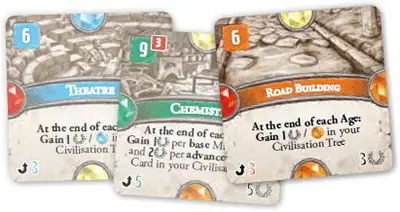
Resolve Influence
First, the player with the highest number of Influence points can assimilate a Mastery from another player. They may choose a Mastery card currently possessed by another player and take the same card from among those still available in the card holders. This card is not taken directly from a player.
The only restriction to this action concerns the level of Mastery card you're trying to assimilate and your level of Influence:
- If your Influence level is 12 or less, you can only assimilate cards of value 3.
- If your Influence level is between 13 and 22 you can assimilate cards with a value of 3 or 6.
- If your Influence level is 23 or more, you can assimilate cards with a value of 3, 6 or 9.
The player may also choose to assimilate an Advanced version of a Skill that has been developed by another player, on the condition that they already possess the base version of that Mastery themselves.
Should they choose to do so, they simply turn the card that they already possess to its advanced side without paying the cost. They do not take an additional copy of that card. The effects of an assimilated card take effect immediately.
Once the leading player has assimilated a card, each player scores Victory Points equal to their current number of Influence points. All players keep their Influence points for the next Age.
Determine Roles
Whoever has retained the most resources in each Knowledge Domain at the end of an Age gets the help of a high-ranking citizen adept in that type of skill: A great Inventor, Diplomat, Craftsman etc.
The player takes the corresponding Domination card for the next Age and gains a special benefit from their assistance.
-
Government - Governor (+6VP / 0 VP in a 2 player game)
You determine the Turn order of the next Age. The player with this card places the player tokens onto the Initiative track in the order of their choice for the next Age.
-
Religion - High Priest (+5 VP)
You draw 2 additional Land tiles into your hand at the start of the next Age.
-
Art - Diplomat (+4 VP)
You immediately gain 2 Influence points.
-
Trade - Trader (+3 VP)
Each time you place a Land tile, that Land tile's Camp generates 2 Knowledge instead of 1 for the rest of the Age.
-
Science - Inventor (+2 VP).
Once during the next Age, you can activate a Land tile already in place instead of placing a new one (scoring resources as per the usual rules , including for Cities).
If reactivating a tile would cause a normal connection and a Locus, you may choose which one takes effect. It is possible to use the Inventor to reactivate a Locus where a Monument has been constructed: lift up the Monument and score the resources underneath.
-
Craftmanship - Farmer (+1 VP)
Once per Age, during one of your turns, you may place a second Land tile immediately after placing and scoring the first. This second tile follows all of the normal rules for tile placement.
Each player immediately scores the number of Victory Points stated on each card.
Once Domination cards have been used (if their effect can only be used once), they may be returned to the common area of the table.
A player may take several or even all of the Domination cards. If no player has any remaining Knowledge points in a Domain then the Domination card cannot be claimed.
Before starting the Next Age
Each player resets all of the Knowledge points on their player board to zero. You will start the next Age with no knowledge unless you have one or more cards indicating otherwise.
Players replenish their hand of tiles.
They may choose to keep one or more of the Land tiles from their remaining hand, discarding the others to the back of the Land tile holders.
They may then draw back up to 7 Land tiles (or more if they have a card indicating otherwise) to complete their hand. Just like during initial setup, a player may choose to discard part of or all of their hand once and drawback up to 7 (or more) Land tiles. You may only redraw your hand once per Age.
The next Age can then begin.
End of the Game
The first and second Ages are played the same way. The Third (and last) Age is played slightly differently, however.
End of Age
Once this Third Age is over, players proceed to the Influence phase and trigger other End of Age effects as normal.
For the distribution of the Domination cards, this follows the same rules as usual, except that each card is worth 3 points rather than its usual value and does not activate its ability. For example, the Diplomat does not allow a player to gain Influence points at the end of the Third Age.
Additional Steps For Final Scoring
Objective Cards
In Dominations, the aim of the game isn't to copy History. However, Objective cards give you the chance to walk in the footsteps of some of History's greatest Nations.
Each Objective card has 5 Objectives that gain you Victory points at the end of the game if you manage to complete them. These can be having a number of Monuments or Cities of a certain level, a certain number of Nodus of a given color in your Civilization Tree, and more.
The first 3 Objectives are based on the Nation's real History, whereas the final 2 represents what they could have become, had they had more time, more resources, more luck...
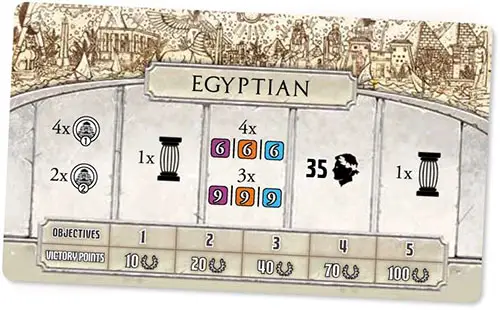
The icons on the cards represent

You must finish the game in possession of a certain number of Cities of certain levels. In this case: five level 1 Cities and one level 2 City of a higher level than the one stated count towards your Objective. For example, a City of Level 2 or 3 can count as a Level 1 City.
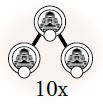
You must finish the game with a certain number of your Cities adjacent to one another. In this case: 10 adjacent Cities.
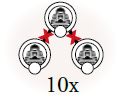
You must finish the game with a certain number of Cities that are not adjacent to one another. In this case: 10 non- adjacent Cities. A group of adjacent Cities counts as one non-adjacent City.

You must finish the game in control of a Monument. To do so, a player adds the number of level cards they possess for a Monument in their Civilization tree to the number of City Levels that they have built adjacent to that Monument. The player with the highest score controls that Monument. In the case of a Tie, the player in possession of the Level 1 card for that Monument wins.

You must finish the game with at least a certain number of Nodus in your Civilization Tree. In this case, 8 Trade Nodus, 5 Government Nodus and 3 Science Nodus.
Reminder: these must be whole Nodus created by joining two Mastery cards. Half Nodus do not count.
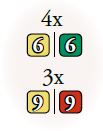
You must finish the game with a certain number of Influence Points. In this case, 30.
You must finish the game with a certain number and Domain of Mastery cards in your Civilization Tree. In this case: four level 6 Trade and/or Science Mastery cards AND three level 9 Trade and/or Government cards.
The number of points you score from your Objectives depends on how many you achieve:

Once the scores from Objectives have been calculated, the player with the most Victory Points wins the game!
In the case of a tie, the player highest on the Initiative track wins!
Continue Reading
